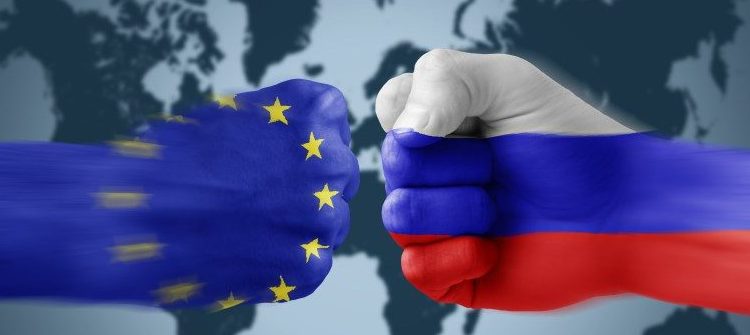“The EU sanctions against Russia are likely to be prolonged at the European Council meeting in December,” Radio Liberty reporter Rikard Jozwiak tweeted in early November. Predictions like this hit the headlines of international media almost on a daily basis. Oleksii Kovalenko tried to unravel, what is the best decision for the EU to make – to lift the sanctions, to extend them again, or to tighten the sanction regime against Russia.

Economic sanctions have gained increasing popularity in the era of nuclear proliferation because conventional military pressure and warfare poses a universal threat. The primary purpose of economic sanctions is coercing a government into changing or reversing existing policies. By imposing economic sanctions upon Russia, the EU signalled to Moscow and the rest of the world that violating international legal norms and disregarding peace and security is unacceptable. The EU sanctions put certain constraints on the Russian leadership, the elites, and economic entities that are safeguarding the current Russian political regime through financial and political means.
However, as Russia continues its aggressive foreign policy, apparently the coercive power of sanctions was not sufficient. At the same time the existing sanctions have put certain pressure on the EU economy as well. Furthermore, current political developments in the EU including Brexit, the threat of terrorism, and growing pro-Russian sentiments within the EU establishment challenge the EU’s stance towards possible expansion of sanctions against Russia. Washington, DC continues convincing the EU countries to comply with their initial commitments and to synchronize their sanctions with the US. Meanwhile, given the rise of populism in the EU, voices supporting the suspension of EU restrictive measures are getting louder.
Are sanctions against Russia working?
“It was the first time that we decided on this without any disputes and arguments,” European Council President Donald Tusk stated at the EU summit on December 14, 2017 after extending Ukraine-related sanctions against Russia for six consecutive months. Two years on, most European leaders still seem to be full of undue optimism that simply extending old sanctions linked to the aggression in Ukraine every six months, without major changes
in the sanction regime, will be successful.
Yet the question “Are current sanctions against Russia really working?” is rarely publicly asked. They are certainly successful in signalling that certain type of geopolitical behaviour is unacceptable. However, the current sanctions mechanism is problematic on several accounts. First, the impact of the EU sanctions is usually greatly overestimated; second, apparent loopholes in the EU individual sanctions allow banned individuals and their companies to circumvent the sanction regime; and third, the EU uneven sectoral sanctions do more harm to the European unity than to the Russian economy.
How big is the impact of EU sanctions on the Russian economy?
Following the first package of EU sanctions in March 2014, Russian ruble depreciated by almost twice. Back then the ruble’s value was consistently falling down by over 10 % per month. To stabilize the depreciation of its currency, Russia increased the short-term interest rate to 20 %. According to OECD data, Russian inflation surged by 170 % in January 2018 (100% in 2010), which was a result of currency depreciation. Russian GDP in current US dollars declined almost twice – from 2,297 trillion in 2013 to 1,283 trillion dollars.
The sanctions were successful in reducing foreign investment in Russia. While the US and EU investment in Russian businesses nearly disappeared, Moscow had no major alternative source to make up for this loss.
At first glance, economic impact of EU sanctions on the Russian economy is undeniable. In fact, they contributed to Russia’s economic decline, but a number of other factors had even larger impact. By saying that “Russia is a gas station masquerading as a country,” late US Senator John McCain, Arizona Republican, meant that the Russian economy is heavily dependent on gas and oil. The revenue obtained from oil and gas taxation constitutes a half of Russian federal budget revenue and almost 30% of the consolidated budget revenue. Earnings from Russia crude oil, petroleum products, and gas exports accounted for 16.1% of Russian GDP in 2014, 15% in 2015, and 11.8% in 2016.
Significant dependence on natural resources’ production explains the reasons behind the decline of the Russian economy even better than Western sanctions do. Oil prices were in continuous decline since 2013 when the cost of a barrel stood at $95.79 to 2016 when the world observed the historical minimum over the last decade – $37.02 per barrel. It was the oil price drop that largely contributed to the Russian economy’s recession.
Another reason was Russia’s heavy dependence on borrowings from abroad. Once Russian banks and companies were flung out of refinancing because of Western sanctions, they faced payments for their earlier loans, which constituted as much as 10 % of Russian GDP. As a result, the Russian Central Bank had to switch to a freely floating ruble while continuing to sell the foreign currency. Low petroleum prices, previous financial policy mistakes, and Western sanctions targeting Russian financial sector doomed the country’s financial market and resulted in the economic recession.
However, since 2016 when crude oil prices started recovering, Russian currency stabilized and most of economic indicators improved considerably. Thanks to Russian real year-to-year GDP growth in 2017 and 2018, the GDP level of the pre-sanction year of 2013 was exceeded. This shows the insignificance of EU sanctions as a way to punish the Russian economy.
Do sanctions hurt banned Russian individuals?
EU individual sanctions do not show significant impact either. Different loopholes in the sanction regime allow banned individuals to operate in the EU. Many Russian companies, which are not directly affiliated with the banned individuals, succeeded to raise capital from Western investors and to access Western financial markets. Moreover, according to the report by the Organized Crime and Corruption Reporting Project, the EU and offshore tax havens are “accepting billions of dollars of dirty money from Russia.” As OCCRP report states, Russia laundered from $20 to $80 billion from 2011 until the end of 2014, that is, almost a year since Western sanctions were in force. According to Anders Åslund, Swedish economist and Senior Fellow at the Atlantic Council, in 1991-2016 the EU and offshore tax havens have accepted over $700 billions of Russian dirty money.
Visa sanctions against Russian individuals are also occasionally bypassed. For instance, banned individuals can request an exception based on invitation by intergovernmental organisation. Some sanctioned Russian celebrities visited EU countries using exceptional visas based on humanitarian needs.
Some EU countries like the United Kingdom have been repeatedly accused of not sufficiently combatting the laundering of Russian dirty money through real estate and banking institutions. The EU updates its individual sanctions from time to time by adding a broader number of Russian officials and businesses to the sanctions list. In the same manner, in March 2019 Brussels followed the US and Canada in introducing more than a dozen of new sanctions’ targets related to the seizure of Ukrainian vessels in the Kerch Strait or illegal activities in the annexed Crimea. However, Russia largely proved its immunity to such measures and continues to effectively play with the loopholes in the EU and international law.
To lift or to tighten?
EU sanctions against Russia appeared to be much milder than the US ones. The EU countries are more divided on the issue of sanctions against Russia than ever before. Most importantly, EU sanctions do not work as they were intended to: as oil prices went up in 2016 the Russian economy started recovering, banned individuals manage to bypass sanctions thanks to various loopholes in the sanction regime, EU tax havens continue to accept Russian oligarchs’ dirty money, and uneven EU sectoral sanctions do more harm to the EU unity than to the Russia’s energy sector. In 2018, Russian gas and oil exports to the EU reached a record in the last three years. As such, Kremlin has no serious, life-threatening reason to give up on its aggressive voluntaristic foreign policy.
Since the current sanctions mechanism does not work properly and is incapable to make a change in Russia’s foreign policy, Brussels has only three options to go with:
– to lift the sanctions;
– to tighten and expand the sanctions until Russia agrees to respect international law;
– to continue with existing uneven sanctions.
The last option leads to nowhere, while the first one is the worst-case scenario since it means giving up on the future of the Eastern Europe, and the EU’s future as well. The second is risky, especially regarding the EU energy security, but it is the only possible way to force Kremlin to change its foreign policies. Tightening sanctions would also stress the EU’s firm position towards respect of international law norms and territorial integrity of Ukraine, which remains under pressure of pro-Russian lobby.

